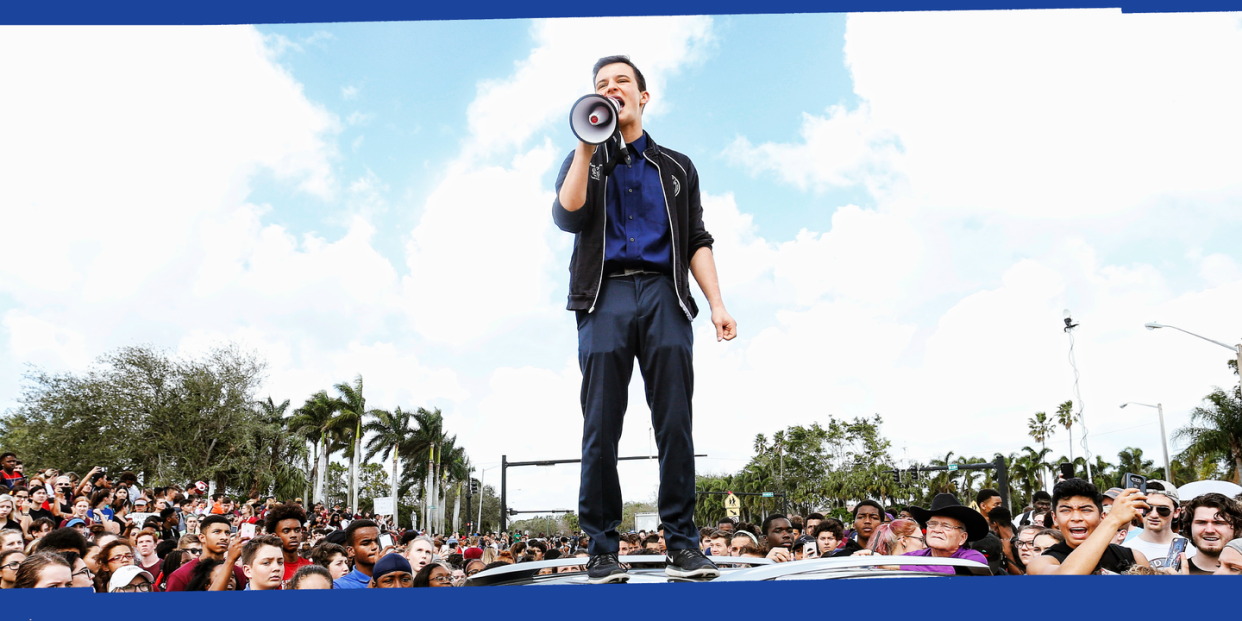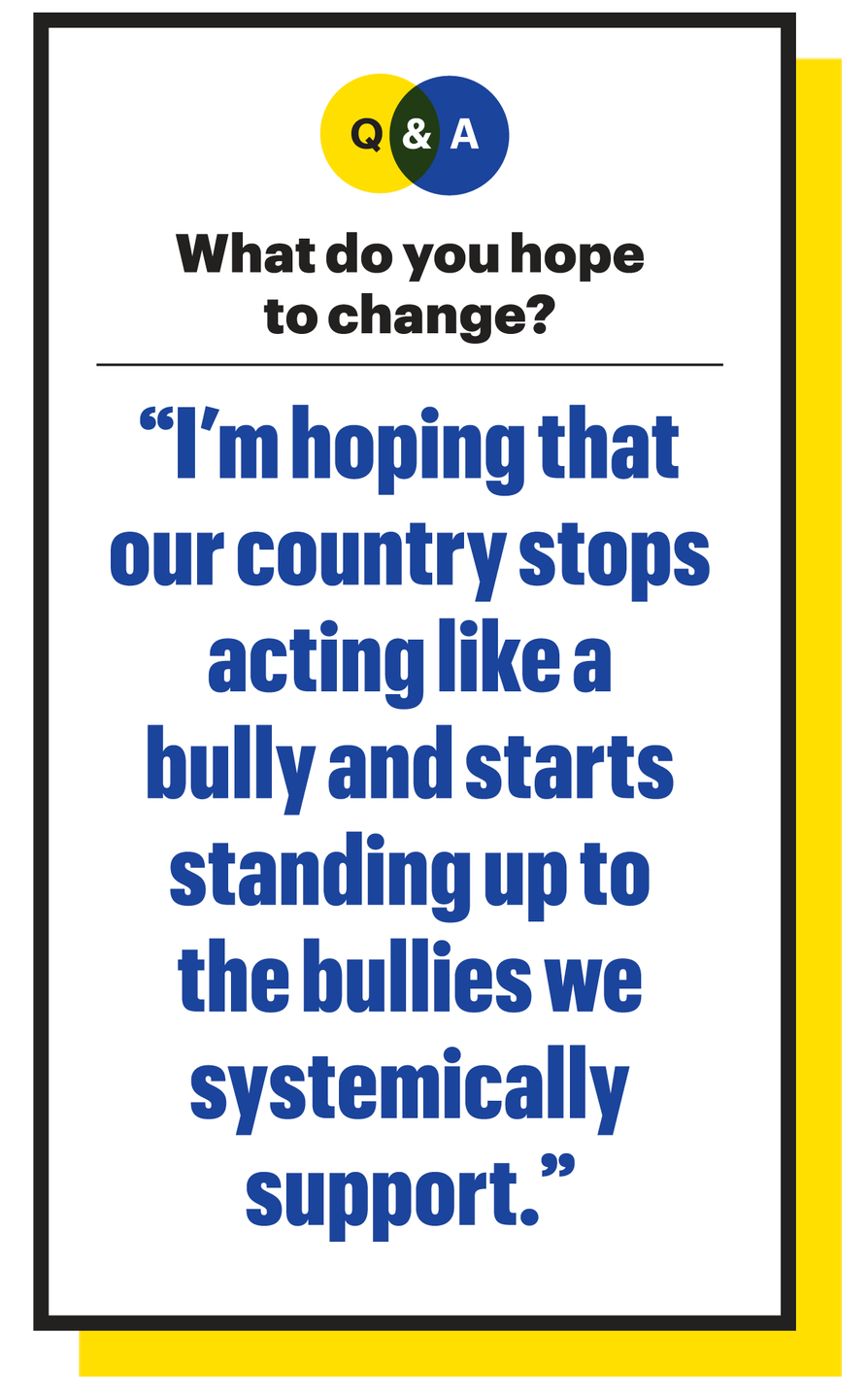Cameron Kasky Is Rethinking the Role of Activism


This story is part of The 2020 Project, a Men's Health special project that explores the lives of 20 different 20-year-old men across America. To learn more about the others, go here.
CAMERON KASKY SPENT much of his summer in a little town house in Alaska, taking a fiction workshop toward a degree at Columbia University and looking back at the very dramatic but very nonfictional arc of his life so far.
On February 14, 2018, Kasky was a junior at Marjory Stoneman Douglas High School in Parkland, Florida, when a gunman opened fire, killing 17 people and injuring 14 others. Kasky and his younger brother, Holden, survived by hiding in a classroom. It was one of the deadliest U. S. mass school shootings ever.
Kasky and his classmates, including fellow survivors Emma González and David Hogg, created a youth activist group called Never Again. Their goal: to personalize the fight for gun control through student-led political activism. Their fury also fueled the rise of the nationwide March for Our Lives movement.
With Gen Z poised to make up one of every ten voters eligible for the upcoming presidential election, there’s pressure on Kasky’s generation to vote change into office. He says he feels it with more than 400,000 followers on Twitter, including Bernie Sanders and Lin-Manuel Miranda.
The more Kasky has spoken out, the more he’s become a target for trolls, he says. He’s also aware that far more than school shootings threatens young Americans right now. All of this has made him think about mental health—the nation’s and his own. “I wanted to socially distance myself from the continental United States,” he says.
Members of Gen Z are more likely than others to describe their mental health as fair or poor, according to a January 2019 report by the American Psychological Association. Seventy-five percent say that mass shootings are a significant source of stress, compared with 62 percent of adults overall.
“You’re going to have a traumatized generation: the generation that went to school and walked around and saw guns being pointed in their faces,” Kasky says of the armed security guards who now roam school grounds across the United States. “Schools aren’t investing in counselors or mental-health services. They’re investing in cops pointing guns at kids.”
Plus, there are other anxieties brought on by living online, from FOMO to cyberbullying. Adults ages 18 to 29 are more likely than their elders to suffer high levels of psychological distress, including anxiety, sleeplessness, depression, and loneliness, according to Pew Research Center surveys in March and April of 2020. “Our generation has a mental-health crisis,” Kasky says.
He knows about all of this firsthand, living with bipolar disorderas well as anxiety, depression, and PTSD from the shooting.

For Kasky, figuring out what’s next starts with taking a step back. For some time, he says, the trauma of Parkland was the way he chose to talk about better mental health for all. But meanwhile, he was undergoing a personal struggle with bipolar disorder, anxiety, and depression that went unacknowledged. “I was raised to think that men don’t feel sad; men don’t cry. A man’s masculinity is a very, very fragile thing. It’s something that can cause a man to do very stupid things to protect.
“I almost lost my life to my mental-health issues. I was quite suicidal for quite a bit of time. And if I had not accepted the fact that I have bipolar disorder and made the effort to medicate it, I wouldn’t be here right now. . . . But when I did it, it saved me.” And now Kasky says he’s trying to determine how best to talk about all that.
As he has taken time to work on himself in Alaska, he’s also reevaluated his position in the public eye, given the abundance of activists who deserve a mic. In the wake of the George Floyd killing and the recent surge in Black Lives Matter protests, Kasky says he realized his words may have resonated so much because, yes, he’s a survivor, but also because he’s white.
“The United States doesn’t feel collective grief when children of color are murdered. But when white children are murdered, they seem very, very interested,” he says about the general public reaction to recent killings. “It’s so bizarre, because so many people struggle for decades to have their voices heard. And me? I almost resent how heard my voice is—it’s such a place of privilege.”
Kasky says he’s also concerned about how social media is fueling a kind of virtual lip service, with people posting black squares to their feeds, supposedly as a form of solidarity, but then quickly moving on to the next hashtag-worthy moment.
But Kasky adds that he’s become self-aware enough to realize that he too may be playing a role in that cycle. “I’m walking around on fucking Instagram, and going on the TV, and espousing my views.”
As protesters for BLM have converged (COVID-19 be damned), only to be knocked down, tear-gassed, trampled, and arrested, Kasky has been frustrated that he has the luxury of being safe as an activist when so many people of color don’t. And he’s wondering if he should even be on the stage. “I think a lot of white activists are in a place right now where it’s kind of our turn to shut up,” he says. “It’s time for us to stop and listen and learn.”
But there’s still so much that needs to be said, even though what’s in store after the turn of the decade is unclear for Kasky and many 20-somethings like him who are trying to come of age in a country that’s “giving them a big middle finger,” as he puts it.
“I’m facing this big, leviathan future, and it’s like a void.” There’s frustration in his voice when he talks about Gen Z’s potential and what he sees as the United States’ blatant disrespect for what it stands for.
“We’re inheriting a world that is a world of hate. And look, the world has always been a world of hate; this has always been a country of hate,” Kasky says. “But there’s no facade anymore. The curtains have been pulled back. And you can’t fool people.”
He’s using social media to encourage people to vote for the candidate who’s more likely to address mental-health resources on the federal level. When asked about his gun-control activism, Kasky says this: “I think the most effective thing we were able to do was tell the country a story—its own story. I think that storytelling is what I can do in my life.”
Contributing to and leading systemic change is critical, he says. But as he’s discovered, there has to be a balance.
“People are putting their mental health at risk to [create social change]. If you lose your life and well-being in an attempt to advocate for change, the world is losing a valuable person,” Kasky says. “You don’t need to save everybody. You need to save one person. And if that one person is you, then that’s fine.”
You Might Also Like

